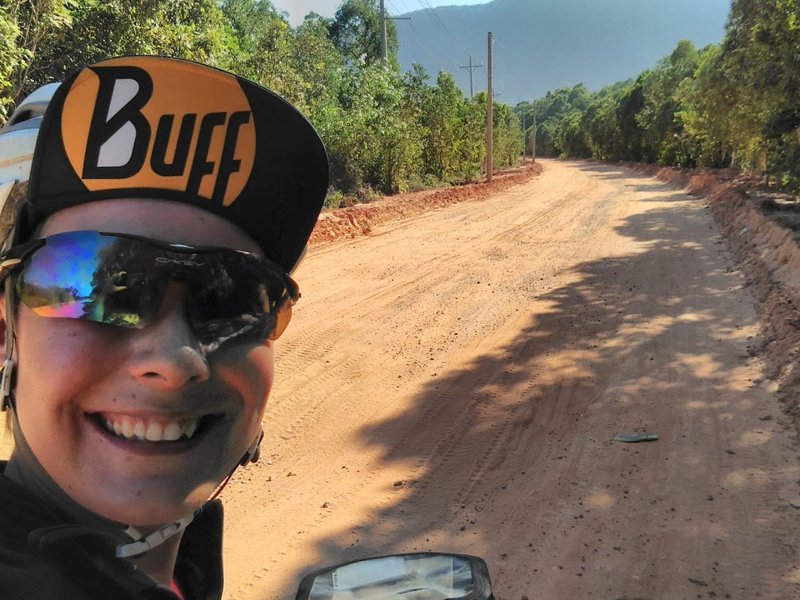My Heart Changed Direction
by Liz Dodd, CSJP Candidate
“My grandmother was very specific: you will know your vocation by the joy it brings you,” said Dorothy Day’s granddaughter, Kate Hennessy, as she sat across from me in my office on a drizzly afternoon in March.
Kate, whom I was interviewing for a magazine, was speaking to my dictaphone, not to me. How could she know that, just a week before, I had caught a first glimpse of my own vocation, over coffee in the cafe crypt of a London church with Katrina, the Sister of St. Joseph of Peace I’d nervously reached out to over Twitter? As far as Kate knew, my vocation lay among articles and deadlines, scribbled shorthand and long, luxurious travel pieces. I had thought the same thing, until I cycled around the world.
The 18 months I spent on the road and in a tent between 2017-18, cycling from London to China then Southeast Asia, then from Canada to the Caribbean, were supposed to help me grow my career as a travel writer. Instead they grew my relationship with God: God, who was there when I woke in the night to footsteps outside my tent, in the freezing Afghanistan winter when I thought he wasn’t there, in long desert stretches and Cambodian minefields. It was only towards the end of my wonky circumnavigation, in the Mexican mountains, that I realised my heart had changed direction. How could it not, when families in the poorest regions of Tajikistan had sheltered me from snowstorms, and I’d shared campfires with the homeless communities that live in parks along America’s Pacific Coast? On starlit nights, camped near Cenote on my way through sweltering Yucatan, I realised there was a wide, open space where my plans for the future had been; and only God could fill it.
The idea that I might have a religious vocation had bubbled up in me before, an urge that burst loose sometimes like sparks from a fire. Only this time, rather than trying to smother it, I arranged to meet with a diocesan vocation director back in London. One day, after months of saying the things I thought I ought to say about what I ought to want, a different spark flew free. I told her I wished I had a vocation like Dorothy Day, to serve the poor in solidarity like the Catholic Workers I volunteered with, like the peace activists and environmentalists I had encountered in my work as a journalist.
My conversation with Dorothy’s granddaughter happened weeks later; that same evening, I met Katrina a second time, at the screening of a film about Dorothy Day, and on the train home devoured the biography of Mother Clare she’d brought me. The next time I met with my vocation director, after the heady silence that followed my tumble of words and excitement at these sisters I had found, she asked if I was ready to make a decision, to become an Inquirer. And the next day, England went into lockdown. The pandemic, which had been a shadow in the background, suddenly engulfed everything, like it did the lives and loves of communities worldwide. But Jesus didn’t stop calling: in fact, with everything else turned down low, his call felt clearer and more irresistible than before.
It came in two ways that were distinct but inseparable, like the same song played in stereo: my journeying with Sister Maureen as an Inquirer and my volunteer work with London Catholic Worker, which had grown to match the desperate need of our borough. Our fortnightly soup kitchen became a daily foodbank and meals-on-wheels. Before work I sat with a vast spreadsheet of hundreds of names—families, asylum seekers, homeless people—of those who had nothing to eat except what we could scramble to deliver to them with our bicycles, willing walkers, retirees with cars and beaten up vans. After work I would join them, the panniers that once hauled my life around the world stuffed with food parcels and meals.
I spent Vocation Sunday delivering meals on one of London’s most deprived estates, although I didn’t realise that until later. And when I did, Dorothy’s words came back to me: how else but vocation to find joy and peace and meaning in the face of suffering and injustice? When I first heard that phrase, when Dorothy spoke it to me through her granddaughter in a busy newsroom, “vocation” meant a puzzle to be solved. Now, a pandemic away, it felt like an alignment, a wholeheartedness: mine, and God’s, and what that looks like together in the world.
Editor’s Note:
An Inquirer is someone discerning religious life with a particular congregation. On November 5, 2020, Liz Dodd was formally welcomed into the Congregation of the Sisters of St. Joseph of Peace as a Candidate.
This article appeared in the Spring 2021 issue of Living Peace.

